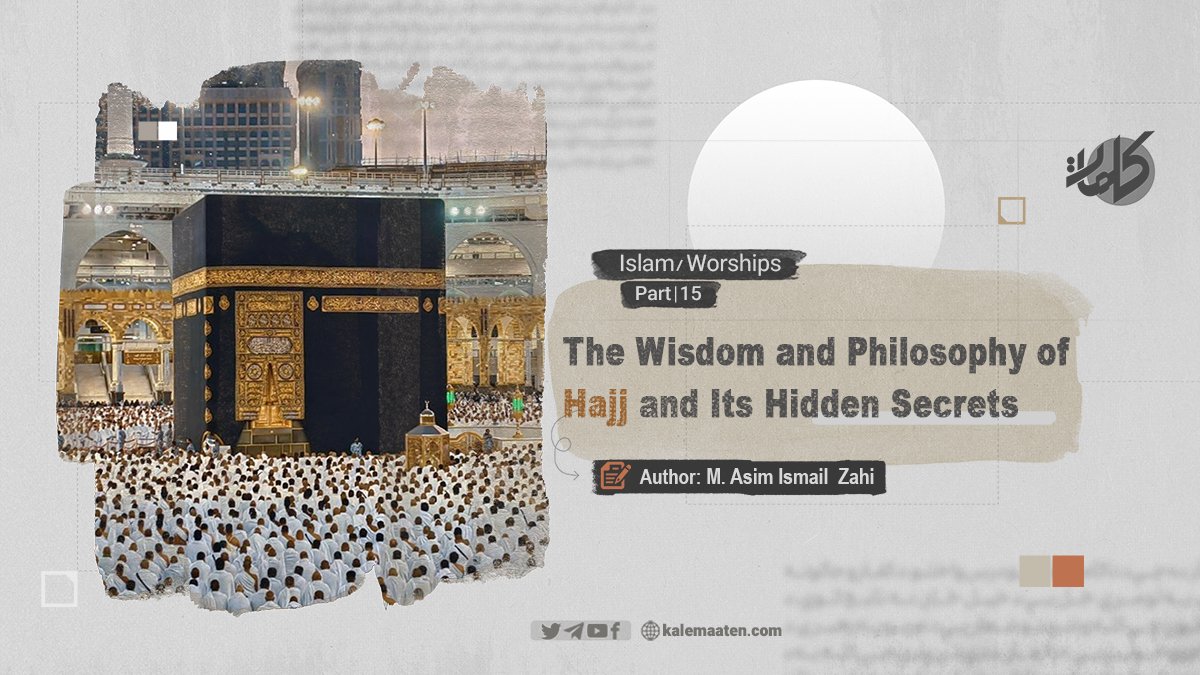
Author: M. Asim Ismail Zahi
The Wisdom and Philosophy of Hajj and Its Hidden Secrets (Part 15)
A Summary of the Wisdom and Philosophy of Hajj, Along with Responses to Common Doubts Surrounding It
Wisdom and Philosophy of Hajj
The wisdom and philosophy behind Hajj can be examined from several dimensions:
1. The Ethical Dimension of Hajj:
The most important philosophy of Hajj is the moral transformation it brings about in people. The act of ihram completely removes a person from material entitlements, superficial distinctions, and extravagant garments. Those who, in normal life, feel burdened by imagined privileges, titles, and medals suddenly become light, relaxed, and untroubled.
2. The Political Dimension of Hajj:
Hajj is a powerful means of unifying the ranks of Muslims. It combats nationalistic fanaticism and racism, transcending geographical boundaries. It serves as a vehicle for the transfer of political news from one Islamic region to another. Ultimately, Hajj plays an influential role in breaking the chains of subjugation and colonialism, liberating Muslims.
3. The Cultural Dimension of Hajj:
This magnificent gathering serves as a natural and authentic representation of all strata of the global Muslim population, as pilgrims come from diverse groups, races, and languages. Islamic traditions tell us that one of the benefits of Hajj is the dissemination of the legacy of the Messenger of Allah (PBUH) to all corners of the Islamic world.
4. Unity:
One of the most remarkable and visible aspects of Hajj is the feeling of unity and solidarity that arises at the highest level of human meaning, through the grace of Islam. Scholars and laypeople, young and old, men and women, black and white all surge and flow together around one center and under one law—moving, running, sitting, and rising together. Establishing unity and cohesion among Muslims from around the world is one of the primary objectives of Hajj. Muslims from different regions gather together: Arabs and Afghans, Turks and Chinese, Indonesians, and others perform the rites of Hajj shoulder to shoulder. They see one another as religious siblings and descendants of Prophet Adam, not looking down or up at one another based on social status.
5. Economic Benefits:
Pilgrims from various cities and countries can learn about the exports and imports of other nations and find paths to trade and economic benefit, gaining for themselves while also providing benefits to their fellow Muslims.
“وَأَذِّنْ فِي النَّاسِ بِالْحَجِّ… لِيَشْهَدُوا مَنَافِعَ لَهُمْ” Translation: “And proclaim the Hajj to the people… so that they may witness benefits for themselves.”
Just as modern nations hold annual exhibitions to showcase their products, Hajj, besides being physical worship, can also be a form of financial worship, i.e., lawful trade. It becomes a marketplace where each nation can present its goods. As Allah says: “لَيْسَ عَلَيْكُمْ جُنَاحٌ أَنْ تَبْتَغُوا فَضْلًا مِنْ رَبِّكُمْ” Translation: “There is no blame upon you for seeking bounty from your Lord (through trade) during Hajj.”
6. Complete Worship:
Hajj is a grand act of worship and a way to express gratitude for divine blessings. Worship means servitude and displaying humility before the Creator. In Hajj, this humility becomes especially vivid—the pilgrim (Haji) in the state of ihram appears humble and unadorned, imagining himself as a weak, regretful slave before his Master, hoping for His mercy. On the plains of Arafat, the pilgrim is deeply remorseful for his sins, casting himself at the gate of his Lord’s sanctuary, crying and pleading for forgiveness.
7. Hajj as a Transformation of Character:
For any pilgrim seeking to improve and transform, there is no better school than Hajj. A period of detachment from sin, visiting sacred lands, and being reminded of the Prophet and the Sahaba—through texts and living memory—is a unique opportunity for profound internal transformation.
8. Hajj as a Miniature Day of Resurrection:
One of the most prominent features of Hajj is how it depicts a scene from the Day of Judgment. Each person is preoccupied with their own state—often half-dressed, disheveled, and anxious—hurrying in every direction. This is why Surah Al-Hajj begins with the imagery of the Day of Judgment: “يَا أَيُّهَا النَّاسُ اتَّقُوا رَبَّكُمْ إِنَّ زَلْزَلَةَ السَّاعَةِ شَيْءٌ عَظِيمٌ”. Likewise, the verses on Hajj in Surah Al-Baqarah conclude with: “وَاتَّقُوا اللَّهَ وَاعْلَمُوا أَنَّكُمْ إِلَيْهِ تُحْشَرُونَ”.
Now, considering all these layers of wisdom embedded within Hajj, can any other act of worship fulfill its comprehensive objectives? Can simply giving charity to the poor replace this great act of devotion?
Continues…


